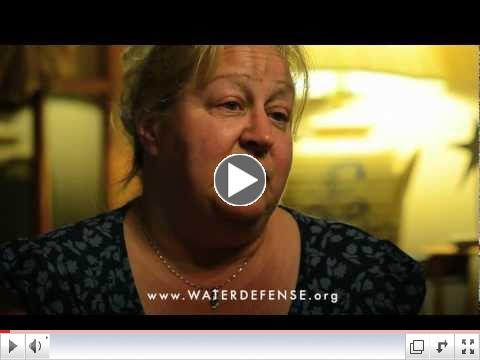|
DEP's New Air Quality Study Was Compromised Before It Began
 | |
DEP Secretary
Michael Krancer
Image: EnviroPolitics
|
The Pennsylvania Department of Environmental Protection announced this week that it will begin a yearlong air quality
study near three compressor stations in Southwest Pennsylvania. The study will test for 48 volatile organic compounds (VOCs), including methane and benzene. What the study does not do, however, is follow standard scientific protocol.
In the study's sampling protocol, DEP describes the procedure it will follow to collect data. Alarmingly, the DEP intends to handle everything in-house, from collecting samples and analyzing lab data to interpreting the results.
"Unfortunately, the DEP's track record of secrecy and protecting unidentified interests over the health of Pennsylvania residents demonstrates they simply cannot be trusted to provide the transparency this crucial issue demands," state Rep. Jesse White told reporter Amanda Gillooly. Can we really trust the DEP to conduct a health impacts study with no third party chain of command?
DEP Secretary Michael Krancer answered that question best when he went on the record saying: "At the end of the day, my job is to get gas done."
The DEP has shirked its responsibilities too long. The people of Pennsylvania deserve to be protected, not placated.
Read DEP's press release on Long-Term Air Quality Monitoring.Read DEP's plan to monitor ozone.Read why Rep. White thinks DEP needs more transparency.
|
Renewable Alternatives
to Natural Gas:
Solar Thermal Electric Photovoltaics Landfill Gas Wind Biomass Geothermal Electric Geothermal Heat Pumps Municipal Solid Waste Anaerobic Digestion Hydroelectric Tidal Energy Wave Energy Ocean Thermal Biodiesel Microbial Fuel Cells
This list is by no means exhaustive. To learn more about renewable energy, click here. For renewable energy incentives by state, check out the DSIRE database.
|
The DEP Needs You!
If You See Something, Say Something
While Corbett and Krancer are busy slicing the DEP's budget and shrinking its staff, the number of Marcellus shale operations is only increasing. We must be vigilant to protect our communities' health.
Make note (better yet - take pictures!) of any unusual or suspicious activity you see. Then:
- For environmental emergencies, tell EPA, too.
- Finally, let RDA know so we can follow up and inform the community
|
Help Improve RDA
News Coverage
Do you know of a story that RDA should cover? If so, e-mail us.
|
Support RDA's Efforts
Are you interested in contributing your time, talents, or resources to seeking truth about shale gas development?
|
|
|
|
|
Act 13 Zoning Provisions Declared Unconstitutional
What the decision means for Lycoming County:
Here in Lycoming County, this court decision validates the position taken by Rep Rick Mirabito (D) who voted "NO" on Act 13. It also serves as evidence that the attorneys, Rep. Everett (R) and Senator Yaw (R) continue to side with the strongly pro-industry majority in Harrisburg, even when legislation violates the rights of citizens they are sworn to protect.
Story excerpted from Pittsburgh Post-Gazette
by: Laura Olson
A ruling issued this morning by a panel of Commonwealth Court judges throws out a set of zoning restrictions approved in Act 13, the state's new shale gas drilling law.
That law, signed by Gov. Tom Corbett in February, enacted a sweeping set of changes for how the oil and gas drilling industry operates within Pennsylvania, including creating an impact fee and, most controversially, dictating what municipalities can and cannot include in their zoning standards for gas drilling.
A lawsuit was filed in March, challenging the zoning provision primarily, arguing that the new law prevented local officials from protecting the health and safety of their residents.
An order attached to this morning's filing declares the zoning provision null and void. A separate provision that allows state environmental officials to waive setback requirements for gas wells also is overturned.
The majority opinion states that requiring municipalities to change their zoning rules in a way that would conflict with their development plans "violates substantive due process because it does not protect the interests of neighboring property owners from harm, alters the character of neighborhoods and makes irrational classifications - irrational because it requires municipalities to allow all zones, drilling operations and impoundments, gas compressor stations, storage and use of explosives in all zoning districts, and applies industrial criteria to restrictions on height of structures, screening and fencing, lighting and noise."
Read more...
|
Quote Of The Week
"6.2% of all well casings fail initially, leading to methane migration. 60% fail over 20 years.
They all fail over time.
These numbers are from the DEP. Why doesn't the industry fix this systemic problem? Because they can't!"
-Dr. Anthony Ingraffea
Distinguished Professor of Engineering
Cornell University
|
MUZZLED:
Most Rural Pennsylvanians Don't Have A Say In Marcellus Development
 Ownership of the land in Pennsylvania counties with the most Marcellus Shale natural-gas drilling activity is concentrated among relatively few residents and people living outside the counties, according to a study by researchers in Penn State's College of Agricultural Sciences.The majority of residents in these counties together own little of the total land area and, therefore, have relatively little "voice" in the critical leasing decisions that affect whether and how Marcellus Shale drilling will occur in the counties, noted the lead investigator Timothy Kelsey, professor of agricultural economics. Together, half of the resident landowners in these counties control only about 1 percent of the land area, and renters have no "voice" at all, the study suggests. Rather it is the top 10 percent of resident landowners, plus outside landowners (both public and private), who are able to make the major leasing decisions that affect communities. Continue reading...
|
BLOOMBERG-
By Jim Efstathiou Jr
A Note From RDA:
Responsible Drilling Alliance broke this story over a year ago via past President and Founder Jon Bogle, although it's only now making its way to national news. Bogle's original coverage of PSU's tactics is still available here.
Pennsylvania remains the largest U.S. state without a tax on natural gas production, thanks in part to a study released under the banner of the Pennsylvania State University.
The 2009 report predicted drillers would shun Pennsylvania if new taxes were imposed, and lawmakers cited it the following year when they rejected a 5 percent tax proposed by then- Governor Ed Rendell.
"As an advocacy tool, it worked," Michael Wood, research director with the non-profit Pennsylvania Budget and Policy Center in Harrisburg, Pennsylvania, said in an interview. "If people wanted to find a reason to vote against having the industry taxed in that way, that gave them reason to do it."
What the study didn't do was note that it was sponsored by gas drillers and led by an economist, now at the University of Wyoming, with a history of producing industry-friendly research on economic and energy issues. The researcher, Tim Considine, said his analysis was sound and not biased by industry funding.
As the U.S. enjoys a natural-gas boom from a process called hydraulic fracturing, or fracking, producers are taking a page from the tobacco industry playbook: funding research at established universities that arrives at conclusions that counter concerns raised by critics.
Continue reading...
|
Natural Gas Exposed:
People-Powered Education
 | |
Video: Water Defense
|
Landowners describe depreciated property values, polluted water, and meager royalties since leasing their land for shale gas development. Video by Water Defense for their Natural Gas Exxposed campaign.
|
|
|
|
|